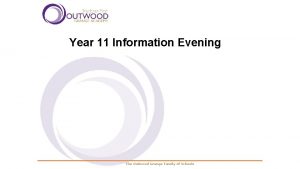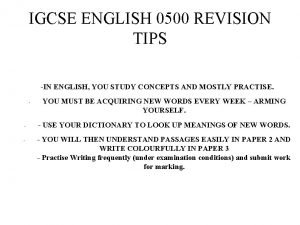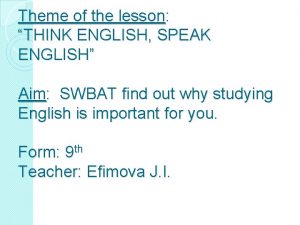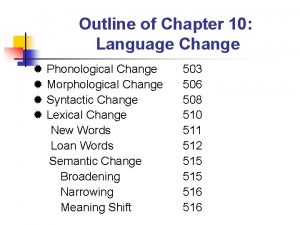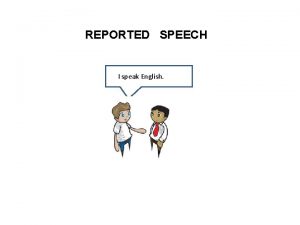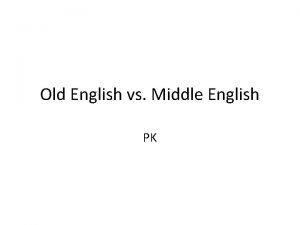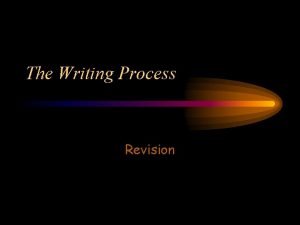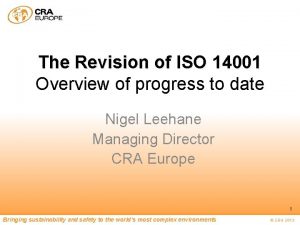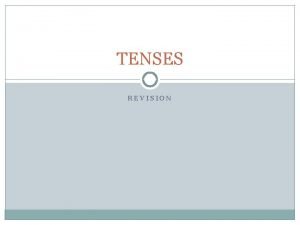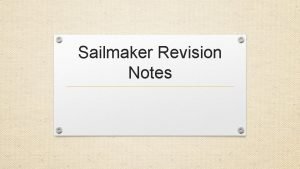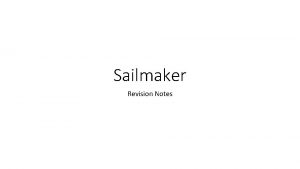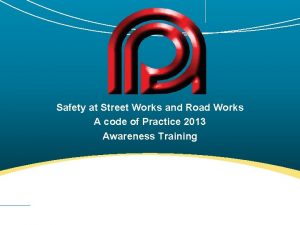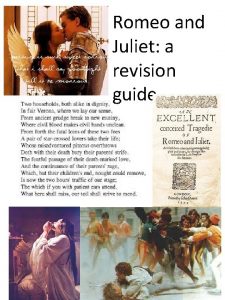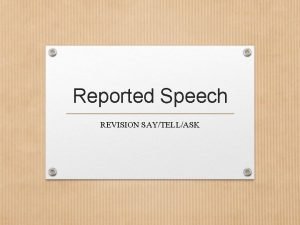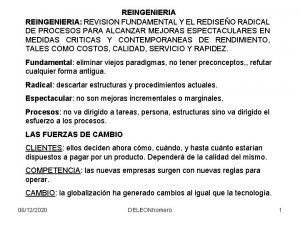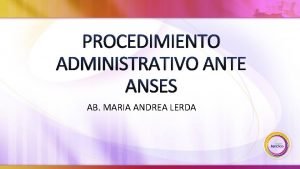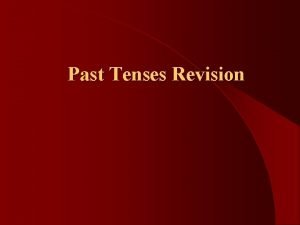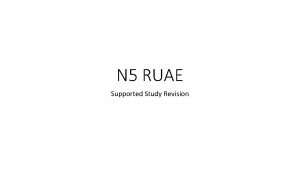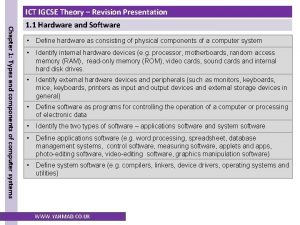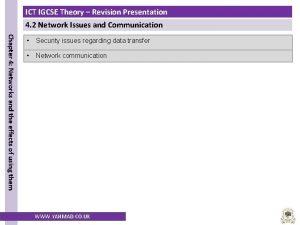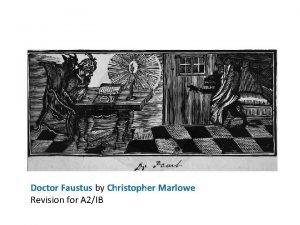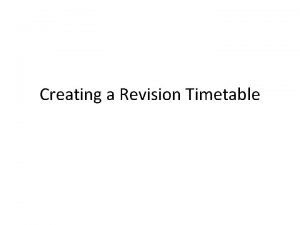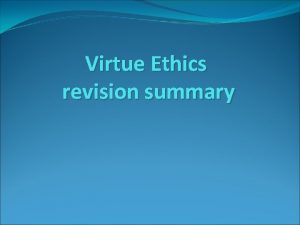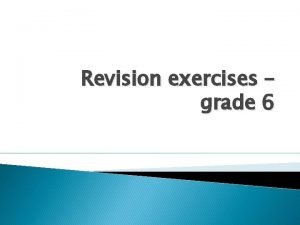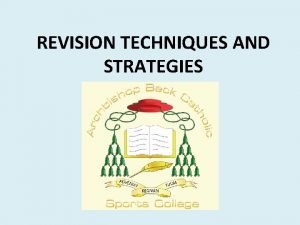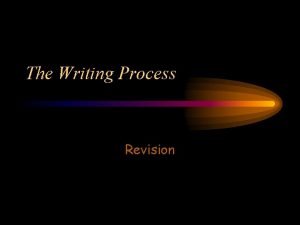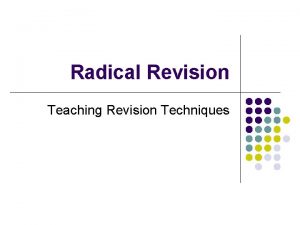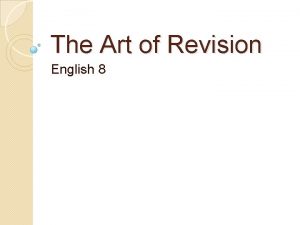AS English Language Revision 10 am 12 pm



















































































- Slides: 83

AS English Language Revision 10 am – 12 pm Miss Cooper

Language and Gender § What are we going to focus on in this session? § § § Simone De Beauvoir Key Words Sexism in Advertisement Theory: Dominance and Difference

‘Woman herself recognises that the world is masculine on the whole; those who fashioned it, ruled it, and still dominate it today are men. ’ - Simone de Beauvoir (1952) § In the 1960 s, American feminists took the questioning of women’s role in society into the field of language. § They drew attention to the ways in which language both reflects and encourages perceptions of gender differences. § They also considered the wider field of communication between men and women, and how issues of language have contributed towards women’s feelings of powerlessness.

Key Word Definition Accent The pronunciation of words Accommodation Theory When we adjust our speech to accommodate others Adjacency Pair A sequence of 2 related utterances by two different speakers. The first utterance leads to a set of expectations about the response. Adjective The word class that modifies nouns Adverb Modifies a verb, an adjective or another adverb. Amelioration A change in the meaning of a word to give it a positive connotation. Anaphoric Reference A word or phrase that refers back to another word or phrase which was used earlier in the written or spoken text. Antonym Two words that express opposing concepts. Auxiliary Verb Combines with another verb to help form tense (to have, to be, to do, will, shall, would, can, may, might). Modal Verb An auxiliary verb expressing necessity or possibility. Borrowing A word taken from another language. Cataphoric Reference A word or phrase which refers forward to another part of the text. Connotation The set of associations implied by a word in addition to its literal meaning.

Key Word Definition Clause A group of words forming a unit within a sentence. Main Clause A clause in a complex sentence that can stand alone as a complete sentence. Subordinate Clause A clause in a complex sentence that can not stand alone as a complete sentence. Conjunction A word that joins or connects clauses. Convergence When the speech styles of two or more people move closer to each other. Declarative Sentence A sentence that makes a statement. Imperative Sentence A sentence which gives a command or instruction. Exclamatory Sentence A sentence ending with an exclamation mark. Lexical Field A group of words with associated meanings. Pejoration When the meaning of a word shifts to become less positive. Pronoun A word that takes the place of a noun. Prosody Non-verbal aspects of speech e. g. pitch, tone, intonation. Register A form of language appropriate to a particular situation. Semantic Loading The meaning of a word or phrase – either explicit or implicit. Taboo Language Words which are avoided because they are considered unpleasant or offensive. Tag Question A question tagged onto the end of a statement. Verb A word which indicates doing or being – e. g. actions or states.

Language and Gender – Sexist Language

A Feminist Takedown of Robin Thicke, And Anyone Who Thinks There's Something "Blurry" About Sexism by Elizabeth Plank If you have ears, you've heard the song "Blurred Lines. " If you have eyes, you've seen the explicit video. If you have a mouth, you’ve had a conversation about it. Maybe it’s sexist? Maybe it’s kind of feminist? Hint: it’s not. People calling the song offensive definitely have a strong case. After all, the song is about "liberating" a good girl by showing her that she actually wants ‘crazy wild sex’ that she isn’t actually asking for. The only thing that's worse than the lyrics? The video. It shows three naked women (sorry, some have flesh-toned thongs and the occasional shoes) prancing around three fully-dressed men — an image that's now become all too familiar in our media landscape. So, let's recap. The lyrics are rapey, the video overtly objectifies women and the only people worthy of clothes are men. I'm sorry, why are we arguing about whether a video that pretty much defines sexism is sexist or not?

Language and Gender – Sexist Language Lexical Asymmetry: Male words and their female equivalents are often unequal (asymmetrical) in their associations and connotations. Examples are: ‘spinster/bachelor’, ‘mistress/master’, ‘madam/sir. ’ The associated or secondary meaning of a word or expression in addition to its explicit or primary meaning (denotation). Task: • Look at the pairs of male and female terms above and note the connotations of each. Are they positive/negative? Do they have different semantic loading? Semantics: The study or science of meaning in language. Sample response to ‘spinster/bachelor’ ‘Bachelor’ denotes an unmarried male and ‘spinster’ an unmarried female, but the connotations of each term carry very different semantic loading. ‘Bachelor’ in collocations such as ‘bachelor pad’ and ‘eligible bachelor, ’ suggests someone who is youthful and who has an enjoyable lifestyle. ‘Spinster’ suggests a more miserable figure: someone who is older, and whose life is dull and unexciting.

Marked and Unmarked Terms § Terms for females are often MARKED by the addition of a suffix to the male term, which remains unmarked: ‘sculptor/sculptress’, ‘usher/usherette’. § Question: What connotations do MARKED terms for females carry? Also, discuss your own attitude towards them.

Insulting Usages § There are many negative terms of insult directed at women, often with no equivalent for males. Often, these words carry animalistic connotations, such as ‘cow, bitch’ and ‘dog’. § The insults for women also have many sexual connotations, such as ‘slut, whore’ and ‘slag’. § Words denoting sexual promiscuity in men tend to be more positive: ‘stud’, ‘Casanova’ and ‘Don Juan. ’ § Discuss: In your opinion, do you think that there are differing attitudes to the sexual behaviour of men and women?

Patronising Usages § Patronising terms for women include ‘babe’, ‘sweetheart’, ‘dear’ and ‘love, ’ though these can be applied to men. § There are several words that compare women to food. Examples: ‘crumpet, ’ ‘tart, ’ ‘sweetie’ and ‘honey. ’ Q: What do you think that this suggests about the purpose of a woman? § The Female Inanimate: This is the use of female pronouns (she, her) to refer to inanimate objects such as cars and ships. § Q: What does the use of the Female Inanimate suggest?

‘Man’ / ‘Mankind’ § ‘Man’ is sometimes used to refer specifically to males, but on other occasions, it is used generically to refer to the whole human race (as in ‘man is a primate). § ‘Mankind’ is always a generic term. § Q: What does ‘Mankind’ suggest about the position of men and women in society? Can you suggest an alternative word that would be more inclusive?

Grammar § Generic ‘he’ The masculine pronoun ‘he’ is used generically (i. e. to refer to both males and females), as in the sentence ‘anyone can choose to vote in the election if he so wishes. ’ § Use of the neutral plural pronoun ‘they’ in such constructions was once common in English. However, prescriptivist grammarians of the 18 th and 19 th centuries have condemned it as incorrect. § Q: What does the use of the generic ‘he’ suggest/imply?

Order of precedence. . § Placing the male word before the female in phrases such as ‘he or she’ and ‘his and hers’ or ‘male and female’, ‘sir or madam’, suggests an assumption that men are of higher status than women in society. Q: Do you agree? § Again, this convention was strengthened by grammarians of previous centuries who decreed that putting the male first was ‘natural’ and ‘proper. ’ Q: What are your views on this?

Non-Sexist Usage § Q: Define the term SEXISM. § Increased awareness of sexism in society has resulted in determined attempts to avoid sexism in language. § Inclusive Usages: Gender specific words such as ‘policeman’ and ‘fireman’ have been replaced by neutral terms: ‘police officer’ and ‘fire-fighter. ’ § Q: Can you think of any gender specific words that have been neutralised to avoid sexism?

Sexism in advertisement. . .






Theory: George Keith and John Shuttleworth (1999) • women - talk more than men, talk too much, are more polite, are indecisive/hesitant, complain and nag, ask more questions, support each other, are more co-operative Whereas: • men - swear more, don't talk about emotions, talk about sport more, talk about women and machines in the same way, insult each other frequently, are competitive in conversation, dominate conversation, speak with more authority, give more commands, interrupt more.

Theory: Lakoff (1975) • Hedge: using phrases like “sort of”, “kind of”, “it seems like, ” and so on. • Use (super)polite forms: “Would you mind. . . ”, “I'd appreciate it if. . . ”, “. . . if you don't mind”. • Use tag questions: “You're going to dinner, aren't you? ” • Use empty adjectives: divine, lovely, adorable, and so on • Use hypercorrect grammar and pronunciation: English prestige grammar and clear enunciation. • Use direct quotation: men paraphrase more often. • Have a special lexicon: women use more words for things like colours, men for sports. • Use question intonation in declarative statements: women make declarative statements into questions by raising the pitch of their voice at the end of a statement, expressing uncertainty.

Theory: Lakoff (1975) • • • Use “wh-” imperatives: (such as, “Why don't you open the door? ”) Speak less frequently Overuse qualifiers: (for example, “I Think that. . . ”) Apologise more: (for instance, “I'm sorry, but I think that. . . ”) Use modal constructions: (such as can, would, should, ought - “Should we turn up the heat? ”) Avoid coarse language or expletives Use indirect commands and requests: (for example, “My, isn't it cold in here? ” - really a request to turn the heat on or close a window) Use more intensifiers: especially so and very (for instance, “I am so glad you came!”) Lack a sense of humour: women do not tell jokes well and often don't understand the punch line of jokes.

Theory: O’Barr & Atkins (1980) § A 1980 study by William O'Barr and Bowman Atkins looked at courtroom cases and witnesses' speech. § Their findings challenge Lakoff's view of women's language. In researching what they describe as “powerless language, ” they show that language differences are based on situation-specific authority or power and not gender. § Of course, there may be social contexts where women are (for other reasons) more or less the same as those who lack power. But this is a far more limited claim than that made by Dale Spender, who identifies power with a male patriarchal order - theory of dominance.

Theory: O’Barr & Atkins (1980) § O'Barr and Atkins studied courtroom cases for 30 months, observing a broad spectrum of witnesses. § They examined the witnesses for the ten basic speech differences between men and women that Robin Lakoff proposed. O'Barr and Atkins discovered that the differences that Lakoff and others supported are not necessarily the result of being a woman, but of being powerless… § O'Barr and Atkins concluded from their study that the quoted speech patterns were “neither characteristic of all women nor limited only to women”. § The women who used the lowest frequency of women's language traits had an unusually high status (according to the researchers). They were well-educated professionals with middle class backgrounds. § A corresponding pattern was noted among the men who spoke with a low frequency of women's language traits. O'Barr and Atkins tried to emphasize that a powerful position “may derive from either social standing in the larger society and/or status accorded by the court”.

Theory: Zimmerman & West (1975) § This is theory that in mixed-sex conversations, men are more likely to interrupt than women. It uses a fairly old study of a small sample of conversations, recorded by Don Zimmerman and Candace West at the Santa Barbara campus of the University of California in 1975. § The subjects of the recording were white, middle class and under 35. Zimmerman and West produce in evidence 31 segments of conversation. § They report that in 11 conversations between men and women, men used 46 interruptions, but women only two. As Geoffrey Beattie, of Sheffield University, points out (writing in New Scientist magazine in 1982): "The problem with this is that you might simply have one very voluble man in the study which has a disproportionate effect on the total. ” § From their small (possibly unrepresentative) sample, Zimmerman and West conclude that, since men interrupt more often, then they are dominating or attempting to do so. § But this need not follow, as Beattie goes on to show: "Why do interruptions necessarily reflect dominance? Can interruptions not arise from other sources? Do some interruptions not reflect interest and involvement? "

Theory: Beattie Opposes Zimmerman & West § Geoffrey Beattie claims to have recorded some 10 hours of tutorial discussion and some 557 interruptions (compared with 55 recorded by Zimmerman and West). § Beattie found that women and men interrupted with more or less equal frequency (men 34. 1, women 33. 8) - so men did interrupt more, but by a margin so slight as not to be statistically significant. § Yet Beattie's findings are not quoted so often as those of Zimmerman and West. Why is this? Because they do not fit what someone wanted to show? Or because Beattie's work is in some other way less valuable?

Theory: Dale Spender § Dale Spender advocates a radical view of language as ‘embodying structures that sustain male power. ’ She refers to the work of Zimmerman and West, to the view of the male as norm and to her own idea of ‘patriarchal order. ’ She claims that it is especially difficult to challenge this power system, since the way that we think of the world is part of, and reinforces, this male power.

Theory: Pamela Fishman § Pamela Fishman argues in Interaction: ‘the Work Women Do’ (1983) that conversation between the sexes sometimes fails, not because of anything inherent in the way women talk, but because of how men respond, or don't respond. § In Conversational Insecurity (1990) Fishman questions Robin Lakoff's theories. Lakoff suggests that asking questions shows women's insecurity and hesitancy in communication, whereas Fishman looks at questions as an attribute of interactions: § Women ask questions because of the power of these, not because of their personality weaknesses. Fishman also claims that in mixed-sex language interactions, men speak on average for twice as long as women.

Theory: Deborah Tannen (1990) § Deborah Tannen (Difference Theory) has summarized her book You Just Don't Understand in an article in which she represents male and female language use in a series of six contrasts. These are: § Status vs. Support § Independence vs. Intimacy § Advice vs. Understanding § Information vs. Feelings § Orders vs. Proposals § Conflict vs. Compromise

Pairing Differences Status Vs. Support Men grow up in a world in which conversation is competitive - they seek to achieve the upper hand or to prevent others from dominating them. For women, talking is often a way to gain confirmation and support for their ideas. Men see the world as a place where people try to gain status and keep it. Women see the world as ‘a network of connections seeking support and consensus. ’ Independence Vs. Intimacy Women often think in terms of closeness and support, and struggle to preserve intimacy. Men, concerned with status, tend to focus more on independence. These traits can lead women and men to starkly different views of the same situation. Advice Vs. Understanding Deborah Tannen claims that, to many men a complaint is a challenge to find a solution. Information Vs. Feelings Historically, men's concerns were seen as more important than those of women, but today this situation may be reversed so that the giving of information and brevity of speech are considered of less value than sharing of emotions and elaboration. Orders Vs. Proposals Women often suggest that people do things in indirect ways - “let's”, “why don't we? ” or “wouldn't it be good, if we. . . ? ” Men may use, and prefer to hear, a direct imperative. Conflict Vs. Compromise “In trying to prevent fights, ” writes Professor Tannen “some women refuse to oppose the will of others openly. But sometimes it's far more effective for a woman to assert herself, even at the risk of conflict. ”

Tannen: Report and Rapport Talk

Theory: Trudgill (1970) § Peter Trudgill's 1970 s research into language and social class showed some interesting differences between men and women. § Trudgill made a detailed study in which subjects were grouped by social class and sex. § He invited them to speak in a variety of situations, before asking them to read a passage that contained words where the speaker might use one or other of two speech sounds § An example would be verbs ending in -ing, where Trudgill wanted to see whether the speaker dropped the final g and pronounced this as -in'.

Theory: Trudgill (1970) § In phonetic terms, Trudgill observed whether, in, for example, the final sound of "singing", the speaker used the alveolar consonant /n/ or the velar consonant /ŋ/. § Trudgill found that men were less likely and women more likely to use the prestige pronunciation of certain speech sounds. In aiming for higher prestige (above that of their observed social class) the women tended towards hypercorrectness. The men would often use a low prestige pronunciation - thereby seeking covert (hidden) prestige by appearing “tough” or “down to earth”. § This research supports the traditional view of women as being more likely to have social class aspirations than men. But it may also be that, as social rules change, this may become less common - as women can gain prestige through work or other activities.

Theory: Coates and Jones § Jennifer Coates looks at all-female conversation and builds on Deborah Tannen's ideas. She returns to tag questions - to which Robin Lakoff drew attention in 1975. Her work looks in detail at some of the ideas that Lakoff originated and Tannen carried further. She gives useful comment on Deborah Jones' 1990 study of women's oral culture, which she (Jones) calls Gossip and categorizes in terms of House Talk, Scandal, Bitching and Chatting. § House Talk - its distinguishing function is the exchange of information and resources connected with the female role as an occupation. § Scandal - a considered judging of the behaviour of others, and women in particular. It is usually made in terms of the domestic morality, of which women have been appointed guardians. § Bitching - this is the overt expression of women’s anger at their restricted role and inferior status. They express this in private and to other women only. The women who bitch are not expecting change; they want only to make their complaints in an environment where their anger will be understood and expected. § Chatting - this is the most intimate form of gossip, a mutual self-disclosure, a transaction where women use to their own advantage the skills they have learned as part of their job of nurturing others.

Theory: Coates and Jones § Jennifer Coates says: § “Lexical items such as perhaps, I think, sort of, probably as well as certain prosodic and paralinguistic features, are used in English to express epistemic modality. . . women use them to mitigate the force of an utterance in order to respect addressees’ face needs. ” “Face” (as in “lose face”) refers to a speaker's sense of linguistic and social identity. Any speech act may impose on this sense, and is therefore face threatening. And speakers have strategies for lessening the threat. Positive politeness means being complimentary and gracious to the addressee (but if this is overdone, the speaker may alienate the other party).

Theory: Cameron (1995) § Deborah Cameron says that wherever and whenever the matter has been investigated, men and women face normative expectations about the appropriate mode of speech for their gender. § Women's verbal conduct is important in many cultures; women have been instructed in the proper ways of talking just as they have been instructed in the proper ways of dressing, in the use of cosmetics, and in other “feminine” kinds of behaviour. This acceptance of a “proper” speech style, Cameron describes (in her 1995 book of the same name) as “verbal hygiene”.

For an interesting and provocative comment on Cameron's ideas, you might consider this from Kate Burridge, in ‘Political correctness: euphemism with attitude. ’ “Not everyone shares my view of PC language. Deborah Cameron (in Verbal Hygiene 1995) prefers not to describe it as euphemism, arguing there is more to political correctness than just “sensitivity. ” A term like “sex worker” is not simply a positive expression for tabooed “prostitute”, but deliberately highlights certain aspects of this group's identity. PC language is itself a form of public action by drawing attention to form, it forces us to sit up and take notice. Euphemisms are certainly motivated by the desire not to be offensive, but they are more than just “linguistic fig leaves”. They can be deliberately provocative too. Think of political allegories like George Orwell's Animal Farm. One of the reasons why such texts are so successful is that they exploit euphemisms to publicly expound taboo topics, while at the same time pretending to disguise that purpose. Like any tease, such disguise may itself be titillating. ”

Language and Power § What are we going to focus on in this session? § Key Terminology. § Political, Legal, Education, Business. § Wareing (Types of Power) § Power in Advertising § Fairclough – Synthetic Personalisation § Grice’s Maxims

Key Terminology

Term Definition Implicature Used to persuade people to take something for granted – forces the audience to agree – e. g. ‘we are fighting for a fairer Britain. ’ Key Terminology Synonymous parallelism Adding something extra/repeating the same idea in different wording. Antithetical parallelism Adding an opposing thought. Jargon Particularly specialist terminology that may exclude others. Negative Face (Brown and Levinson) We try to satisfy the negative face of others by, for example, accompanying requests with apologies. Positive Face (Brown and Levinson) We try to satisfy the positive face needs of others by greeting them, asking them how they are, showing respect, expressing admiration and approval.

Term Definition Deontic modal verbs Obligation e. g. ‘must’ Epistemic modal verbs Discretion e. g. ‘should, could. ’ Hypernym and Hyponym Hypernyms are generic nouns whereas hyponyms are specifics. E. g. ‘cat’ is a hyponym of ‘animal’ and ‘animal is a hypernym of ‘cat. ’ Formulation Rewording and twisting words. Standard English and Received Pronunciation. SE: A dialect – words and grammar – not influenced by geographical position. RP: an accent connected with higher class rather than regional origin. Semantic Derogation. When a negative meaning is attached to some words – e. g. ‘mistress. ’

Political § The purpose of political language is to persuade. To achieve this, politicians use rhetorical devices (rhetoric is the art of using language persuasively). 1. Rhetoric questions 2. Repetition 3. Hyperbole 4. Three-part lists 5. Figurative language 6. First person plural pronoun

Legal 1. Legal language is quite distinctive – it has it’s own lexis. The specific vocabulary used by an occupational group is known as jargon. 2. The syntax is often complex, with lots of subordinate clauses. It’s also repetitive. 3. Because it’s so complex, knowledge of this language gives specialists a distinct advantage over non-specialists. This means that lawyers have a lot of power – if their clients don’t fully understand the difficult jargon, then they have to trust that their lawyers understand it and deal with their case properly.

Education 1. The language of power is seen in schools, colleges and universities. The language of education reflects the power structures in schools. 2. Teachers often use imperatives – open your books and direct interrogatives – what’s the answer to question four? 3. Students use fewer imperatives and ask more indirect questions – is it ok if I go to the toilet? 4. There’s often an imbalance in address terms – students might use respectful address terms to the teacher like sir, or title + surname constructions (Ms Smith), while teachers just use the students first name. This shows an understanding that the teacher has authority.

Declarative Interrogative Imperative Exclamative Declarative sentences are used to convey information or to make statements. E. g. Interrogative sentences are used in asking questions. E. g. Imperative sentences are used in issuing orders or directives. E. g. Exclamative sentences are used to make exclamations: E. g. • Is this your book? • Did you receive my message? • Have you found a new job yet? • Leave your coat in the hall. • Give me your phone number. • Don't shut the door • Stop! • What a stupid man he is • How wonderful you look! • David plays the piano. • I hope you can come tomorrow. • We've forgotten the milk. ALTERNATIVE INTERROGATIVES offer two or more alternative responses: • Should I telephone you or send an email?

Business 1. Power structures in the language of business are very similar to those in education – managers may speak more directly to their employees and employees may use more politeness strategies and fewer imperatives. 2. The hierarchical structure of many businesses is shown in nouns such as subordinate, superior, team leader, and chief executive.

Wareing (Types of Power) One way of classifying types of power, according to Wareing (1999) is in terms of whether they represent political, personal or social group power. Type of power Example Political That held by politicians, the police and those working in the law courts. Personal Those who hold power as a result of their occupation or role, such as teachers and employers. Social Group Those who hold power as a result of social variables such as class, gender and age. Typically (though not exclusively) white, middle-class men hold positions of power.

Power In Advertising Dyer (1982) ‘As a by-product of a capitalist economy, advertising is seen on the one hand as encouraging the private acquisition of good at the expense of all else and, on the other hand, being an essential part of economic prosperity for countries, companies and individuals. ’

Functions of Advertising… Advertiser Function Charities Collecting funds, attracting support and voluntary helpers Commercial companies Selling goods and services, attracting investment, changing attitudes, creating new desires in a target audience, giving information about a product or service Government Giving information, publicising proposals and health and safety issues Media Attracting a target audience, selling advertising space Event Organisers Political parties Promoting events and demonstrations Winning votes, attracting members or financial support Private individuals Selling and purchasing goods and services, announcing personal events and occasions Schools, colleges, universities Informing prospective students of course facilities, and future career possibilities

Fairclough (2001) § Advertising exists as a prime example of ideology at work through building a relationship between text producer and receiver by constructing a ‘product image’ that, in turn, helps to position the receiver as a potential ‘consumer’. § Synthetic personalisation (contents): the construction of a relationship between producer and receiver. § Creating an image of a text (relations): using visual and verbal clues to evoke knowledge, behaviour and lifestyle frames. § Building the consumer (subject position): positioning the receiver as an ideal reader and therefore consumer of the text and product, in line with the text’s ideological viewpoint.

Grice’s Logic of Conversation § Grice concluded that conversation must follow its own set of logical principles or ‘rules’. § He worked out how, even when we don’t mean what we say – that the full ‘pragmatic force’ of our utterance is easily understood, as in this example: Lily: This bottle’s half empty already! Jack: Gosh - is that the time already?

Grice’s Cooperative Principal “Make your conversational contribution such as is required, at the stage at which it occurs, by the accepted purpose and direction of the exchange in which you are engaged. ” § Conversation works only with the co-operation of its participants. § Co-operation is built around a series of ‘Gricean maxims’: §Quality, Quantity, Manner & Relation.

Quality “Do not say what you believe to be false. ” “Do not say that for which you lack evidence. ” So… when someone speaks to us, we assume: § that what they say is not knowingly untruthful; § that the truthfulness of what they say does not need to be stated.

Quantity § “Make your contribution as informative as is required. ” § “Do not make your contribution more informative than is required. ” So… when someone speaks to us, we assume: § they do not purposefully hold back anything that is important; § they do not give more information than is asked.

Manner § “Be perspicuous. ” § “Avoid obscurity of expression. ” § “Avoid ambiguity. ” § “Be brief. ” § “Be orderly. ” So… when someone speaks to us, we assume: § that what they say is being said as straightforwardly as they can say it.

Relevance § “Be relevant. ” So… when someone speaks to us , we assume: § that what they say is relevant to the conversation.

Not Following the Maxims… Grice recognised that whilst we could choose not to follow a maxim, such a choice would be conscious and consequential. A speaker can choose to… § ‘violate’ a maxim and be intentionally misleading. § ‘opt out’ of a maxim and refuse to co-operate. § deal with a ‘clash’ of maxims, for instance, between saying enough and saying all that we know to be true. § ‘flout’ a maxim and be intentionally ironic.

Violating Maxims In this BBC interview between Jeremy Paxman and Michael Howard, the leader of the opposition violates the maxim of relation by not giving an answer that relates to the question: Paxman: Did you threaten to overrule? Howard: I was not entitled to instruct Derek Lewis and I did not instruct him. Paxman: Did you threaten to overrule him? Howard: The truth of the matter is that.

Opting Out Here, Paxman asks the Prime Minister a question; the minister opts out of the maxim of relation: Paxman: “When will war become inevitable? ” PM: “Well I know you have to ask that question but it’s the kind of question I cannot answer. ”

Flouting § What Grice called ‘Implicature’ occurs when a speaker chooses to flout a maxim. § The listener, assuming that the speaker still intends being cooperative, looks for meaning other than that which is said. § The intended meaning will be arrived at through the speaker working out the pragmatic force of the utterance rather than its semantic sense.

A 2 Language Change Revision 12: 30 pm – 2: 30 pm Miss Cooper

What are we going to cover today? § Revision Notes: A List of ESSENTIAL revision topics. § Language Change Theory – quotes you need to remember. § Past Paper Example Script/Marking.

Essential Revision Notes: § Grammar: Loss of inflections and case-endings; word-order; shorter sentences § Lexis: Change and growth of the common lexicon; lexical change, wordcreation, etymology § Semantics: Semantic change; conversion/flexibility § Phonology: Sound changes over time; vowel shift; changes in RP

Essential Revision Notes: § Long-term historic change § Change to spoken and to written forms § Standardizing influences (Caxton, the King James Bible, Johnson, Lowth/prescriptivism) § Sources of variation (temporal, dialectal, regional, class-based) § Semantic change (e. g. cardinal, silly, gay) § Etymology and word creation § Loss of grammatical features (inflection, declension, case endings) since Old English times, leading to flexibility (e. g. conversion from one word class to another) § Socio-cultural causes and consequences of language change in English § Reasons for prestige of written forms

Essential Revision Notes: § Short-term change/language fashions § Change as an inherent feature of living language § new technology § Commerce/trade § arts, media, popular culture § collocations

Essential Revision Notes: § Grammar § Robert Lowth - prescriptive grammar, using classical model § Prescriptivism § Invented rules (deprecating split infinitives, starting sentence with and, double negatives) § Spelling § § § Lexicography Johnson Webster Oxford English Dictionary Changing of British, US and International English

Essential Revision Notes: § Grammar § Robert Lowth - prescriptive grammar, using classical model § Prescriptivism § Invented rules (deprecating split infinitives, starting sentence with ‘and’, double negatives) § Spelling § § § Lexicography Johnson Webster Oxford English Dictionary Changing of British, US and International English

Language Change Theory – What you need to remember… § Milroy – descriptivist - tries to disprove the idea of a ‘Golden Age’ of language – language is evolving. § Aitchison – feels language is continually developing and is not deteriorating because of generation change. ‘Damp Spoon Syndrome, ’ ‘Crumbling Castle View’ and ‘Infectious Disease Assumption. ’ § “…the damp spoon syndrome…” i. e. language change is due to laziness “The only truly lazy speech is drunken speech, where alcohol affects coordination, and English is not getting like drunken speech. ” “…there is a trade off between smooth, fast speech, and slow careful jerky speech. Faster speech involves more words per minute, and cannot be classed as ‘laziness’” § “…the crumbling castle view…” i. e. language is crumbling and needs to be preserved “…implies that the language of English was gradually and lovingly assembled until it reached a point of maximum splendour at some unspecified time in the past. Yet no year can be found when language achieved some peak of perfection, like a vintage wine. ”

Language Change Theory – What you need to remember… § …the infectious disease assumption…” “The wholesale spread of corruption may surely be ascribed to mere infection, to the careless, unthinking assimilation of the floating germs which envelop us. ” § Douglas Bush – Writer – 1972: “…the disease metaphor falls down… people pick up changes because they want to. ” “…changes are not random. They take hold only if the language is predisposed to move in a particular direction. Social contact can trigger a change only if it was already likely to happen… anomalies tend to get smoothed out…”

Language Change Theory – What you need to remember… § Trudgill - descriptivist arguing that language does change and there is nothing we can do about it, but that there is nothing we should want to do about it because it is not a bad thing. Language changes especially in meaning: ‘Language change cannot be halted’ ‘The only languages which do not change are those, like Latin, which nobody speaks. ’ § Ray Harlow – descriptivist ‘All languages are capable of the same types of expansion of vocabulary to deal with whatever new areas of life their speakers need to talk about. ’ § Guy Deutscher – radical prescriptivist: does not see language change as good. ‘Robert Lowth would agree: “the principle design of a Grammar of any language is to teach us to express ourselves with propriety in that Language’ § Roman Jakobson – descriptivist: ‘continual language change is natural and inevitable and is due to a combination of psycholinguistic and sociolinguistic factors. ’

Past Paper Exemplar Identifies GENRE immediately. Also makes reference to TONE and the differences in LEXIS, GRAPHOLOGY, GRAMMAR & PRAGMATICS. GRAPHOLOGY: Layout of text, font. Tone: Formal – Lexical formations (obsolete, archaic) Gives evidence of formality and relates back to language change.

Lexis: BORROWING – Italian language (expansion of travel and broadening of multicultural society. - In modern English, archaic, obsolete term. Formal tone of text – archaic terms. Gives evidence from data. ‘Empire’ – term used widely at time to describe the ownership of ‘ruled’ land. Pragmatically – term suggests ‘pride’ – relates to football.

Orthography – Lexeme ‘tonight. ’ Hyphenated. Word formation process – blending. Archaic/formal lexical choices – ‘to my mind’ ‘having regard’ the idea that football was once considered prestigious/formal. Modern relevance – for the working classes, less formal. Terms of address/position of hierarchy (synoptic). Lexemes suggest power and knowledge.

Less formal/colloquial use of ‘boss’ – suggests football is more accessible to all. Lexical choices – emotive language – shows the change in language is due to social change. (COULD HAVE METIONED: Roman Jakobson – descriptivist: ‘continual language change is natural and inevitable and is due to a combination of psycholinguistic and sociolinguistic factors. ’

Idioms – phrases now part of contemporary spoken and written language. (COULD HAVE MENTIONED AITCHINSON: She feels language is continually developing and is not deteriorating because of generation change. Numeration/no use of colons/short sentences and declaratives – bulletin format. Use of evidence from text. (Needs further explanation).

Colloquialisms – ‘pompey’ and ‘bluebirds. ’ (Could have gone into detail with regard to semantic significance: pompey – derives from Roman General (power) bluebird (happiness). BORROWINGS ‘en-masse’ one body – (French). Colonization/war influence. Could have mentioned: TRUDGILL – ‘Language change cannot be halted. ’

Archaic term ‘telegram’ – obsolete because of technological influence. NEOLOGISIMS have been created for the idea of exchanging information i. e. ‘email. ’ BROADENING of terms ‘shook-up’ (could have mentioned metaphorical semantic loading for further evaluative comment – Douglas Bush ‘Changes are not random. ’)

Modern font choices – influence of technology. Clear font – easy to read/digest information. Less formal. Logo – shows advances in technology. Popularity of internet – larger audiences. More informal. Ray Harlow: ‘All languages are capable of the same types of expansion of vocabulary to deal with whatever new areas of life their speakers need to talk about. ’

Logo ‘BBC sport. ’ – (missed opportunity to write about INITIALISMS – viewed as a subtype of BLENDING). Tone/formality – process of amelioration ‘pesky’ – originally meaning ‘naughty’ – now means ‘slightly annoying. ’ ‘Legend’ – Semantic broadening. Advances in technology – ‘text us’ (missed opportunity to write about conversion ‘noun to verb. ’)

Mark out of /48?

Mark out of /48?
 Active and passive vocabulary
Active and passive vocabulary A level english language frameworks
A level english language frameworks English.revision.outwood
English.revision.outwood Igcse english language paper 1 tips
Igcse english language paper 1 tips Revision.english.outwood
Revision.english.outwood Ogat english revision
Ogat english revision A level english language language change
A level english language language change Think english speak english
Think english speak english Spoken english and broken english
Spoken english and broken english Language change
Language change Father of the tragedy
Father of the tragedy Old english vs modern english
Old english vs modern english American vs english words
American vs english words Difference between british and american english
Difference between british and american english Old english vs modern english
Old english vs modern english “i speak english” he said that he ……english
“i speak english” he said that he ……english Old english vs middle english examples
Old english vs middle english examples The gap between written and spoken english
The gap between written and spoken english Difference between british english and american english
Difference between british english and american english Year 8 spanish revision booklet
Year 8 spanish revision booklet Place value of 6 in 865
Place value of 6 in 865 Revision: passive voice
Revision: passive voice Labelled diagram of the heart gcse
Labelled diagram of the heart gcse Wjec criminology unit 4 advanced information
Wjec criminology unit 4 advanced information Criminology wjec unit 4
Criminology wjec unit 4 Wjec unit 4 criminology
Wjec unit 4 criminology Wjec hospitality and catering
Wjec hospitality and catering Vdot work area protection manual 2019
Vdot work area protection manual 2019 Revision conditionals 0 1 2
Revision conditionals 0 1 2 What is revising?
What is revising? Iso 14001 revision
Iso 14001 revision Revise present simple
Revise present simple Crime and deviance sociology revision
Crime and deviance sociology revision Social class sailmaker
Social class sailmaker Sailmaker alan spence
Sailmaker alan spence Sailmaker revision
Sailmaker revision Safety at road works
Safety at road works Romeo and juliet revision notes
Romeo and juliet revision notes What s your hobby
What s your hobby Revision unit 6
Revision unit 6 Revision image
Revision image Objectives of revision
Objectives of revision Science revision quiz
Science revision quiz Simplify a½ • a⅓
Simplify a½ • a⅓ Rcgp akt practice questions
Rcgp akt practice questions Reported speech with ask
Reported speech with ask Revisión fundamental y el rediseño radical de procesos
Revisión fundamental y el rediseño radical de procesos General revision of assessments and property classification
General revision of assessments and property classification Recurso de reconsideración anses modelo
Recurso de reconsideración anses modelo Revision passive voice answer
Revision passive voice answer Davno proslo vreme engleski
Davno proslo vreme engleski Freytag's pyramid othello
Freytag's pyramid othello Ocr cambridge technicals level 3 sport unit 3 revision
Ocr cambridge technicals level 3 sport unit 3 revision Ruae revision
Ruae revision Grade 11 geometry theorems
Grade 11 geometry theorems Utilerías de revisión
Utilerías de revisión Ict igcse chapter 1
Ict igcse chapter 1 Ict igcse theory revision presentation
Ict igcse theory revision presentation Ict igcse theory revision presentation
Ict igcse theory revision presentation Igcse ict chapter 2 questions
Igcse ict chapter 2 questions Ib psychology revision
Ib psychology revision What is this
What is this Geography paper 2 revision notes
Geography paper 2 revision notes Preparation definition geography
Preparation definition geography Edexcel geography gcse checklist
Edexcel geography gcse checklist Fsmq maths
Fsmq maths How am i glutted with conceit of this
How am i glutted with conceit of this Pasos de la revision de la literatura
Pasos de la revision de la literatura Crime and punishment revision guide
Crime and punishment revision guide Make me a revision timetable
Make me a revision timetable Forces revision poster
Forces revision poster Product design gcse revision
Product design gcse revision A christmas carol revision
A christmas carol revision Is 10262-2019
Is 10262-2019 Virginia work area protection manual 2020
Virginia work area protection manual 2020 Sats 2019 timetable
Sats 2019 timetable Virtue ethics revision
Virtue ethics revision Revision invitation to party
Revision invitation to party Happy dagger quote
Happy dagger quote Revision unit 6
Revision unit 6 Present tense grade 6
Present tense grade 6 Forgetting curve
Forgetting curve Pythagoras nat 5
Pythagoras nat 5 Power and conflict revision booklet
Power and conflict revision booklet


